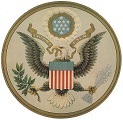Civil Discourse and Difficult Decisions
Courts across the country are implementing this program to foster students’ understanding of the importance of civic engagement, the justice system, and critical thinking skills. Students who have participated in the program in other states have given uniformly positive evaluations.
The program is a three-hour, real-life courtroom simulation presided over by a federal judge and coached by volunteer attorneys. The comprehensive courtroom experience does not require any advance preparation by the teachers or students. Students will learn about and practice civil discourse skills while acting as jurors and student attorneys in a federal courtroom. The judge and attorneys will discuss a landmark Supreme Court case, which students will then apply to a factual scenario describing a situation that high school students may encounter in real life. The program culminates with each student actively participating in a realistic simulated court hearing.
A minimum of 25 and a maximum of 50 students may participate in a session. The program will be scheduled from 9:00 a.m. until 12:00 p.m., and schools will need to provide transportation for students. The court will provide the program and faculty.
Please forward this invitation and the attached program description to any administrators or teachers whom you think might be interested. For more information or to make arrangements to participate, please contact Christa Berry, Clerk of Court, at Christa_Berry@med.uscourts.gov or (207) 780-3356, extension 5101.
The judges and staff of our court are excited to offer Maine’s students the opportunity to obtain a greater appreciation for the critical roles that the justice system and each citizen play in maintaining a vibrant democracy.
Program Description for Judges, Lawyers, and Teachers
Audience Profile and Expectations Form
Article: Students Surprised by Real-Life Courtroom Civility
Classroom Curriculum
Classroom Resources for High School Students:
Uscourts.gov offers a range of educational resources, including written materials, multimedia presentations, and step by step instructions for interactive classroom activities. These cover landmark Supreme Court cases; annual observances of milestones in our nation’s legal history; and First, Fourth, Fifth and Sixth Amendment discussions of how these Rights and the Supreme Court cases concerning them affect students’ lives.
American Bar Association Classroom Lesson Plans on the Constitution (grades 3 – 12):
Classroom-ready lesson plans, activities and discussion topics cover voting rights and election law, the First Amendment, separation of powers, student privacy rights, guns and gun control, and more.
iCivics is a web-based education project designed to teach students civics and inspire them to be active participants in our democracy. iCivics is the vision of Justice Sandra Day O'Connor, who is concerned that students are not getting the information and tools they need for civic participation, and that civics teachers need better materials and support.
Other Useful Resources
 |
Federal Courts and What They Do: A comprehensive overview of the Federal Court system, including discussions of the differences between civil and criminal cases, between state and federal cases, what happens during a trial, and what happens after a verdict or guilty plea. Downloadable .pdf document, 36 pages. |
 |
History of the Federal Judiciary: Presented by the Federal Judicial Center, the education and research agency for the federal courts, resources include materials and activities for teaching judicial history (e.g., the Amistad trial, the trial of Susan B. Anthony, decisions on Chinese exclusion, Labor and Union rights, school desegregation); biographies of federal judges; information on federal court history and administration; talking points on judicial independence, the constitutional origins of the federal judiciary and more. |
 |
American Juror: How Juries are selected: A good overview of the jury selection process and what jurors can expect to experience when they serve. |
 |
The Constitution, Bill of Rights, and other Primary Documents: Scanned images of and information about 100 of our country’s most important historical documents, including the Emancipation Proclamation, the Declaration of Independence, the Civil Rights Act, and the 19th Amendment to the Constitution, giving women the right to vote. Images can be downloaded as .pdf documents. Tools for Educators helps teachers use these documents to meet learning standards, and offers creative teaching ideas and suggestions of how to integrate these documents into classroom curriculum.
|
 |
Ben’s Guide to the the U.S. Government for Kids: A guide to how the United States government works for students, teachers and parents. Includes such topics such as Becoming a U.S. Citizen, How Laws are Made, Branches of Government, and the Election Process. Subject areas are divided by grade range, but the graphics cater to elementary students. |
 |
History of the Great Seal of the United States: Brief overview of the history, design process and the meaning of the Great Seal’s symbols and mottoes. |
 |
Official website of the U.S. Marshals Service, offering fact sheets, historical information and more. |
 |
The United States Attorneys Page: Provides the mission statement and history of the United States Attorneys as well as a list of the current United States Attorneys and recent headlines for each judicial District. |
 |
Official site of the Federal Defender’s Office. This site is not geared toward students, but offers a great deal of information about the duties of the Federal Defender. |
